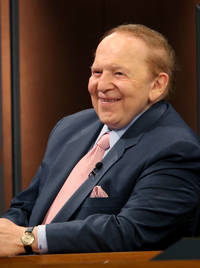Las Vegas Sands Corp. says "enough is enough" – but the U.S. Equal Employment Opportunity Commission refuses to drop its investigation of the 1999 hiring spree for the opening of the Venetian resort on the Las Vegas Strip.
Venetian owner Las Vegas Sands Corp. has denied anyone was discriminated against when the company, controlled by Sheldon Adelson, in 2008 initiated a mass-hiring effort that resulted in 4,018 people working there for the grand opening on May 3, 1999.
As this was the company’s first resort to open on the Strip, Venetian attorneys said the opening process including hiring the employees was a "gargantuan task."
Of the 141,274 job-seekers who called a Venetian interview-scheduling system, 44,332 received interview appointments and 4,018 were hired, Venetian attorneys say.
Of the applicants, the EEOC says 10 filed complaints with the EEOC alleging they were not hired because of their age and an 11th alleged discrimination based on race.
The Venetian says the age discrimination complaints were filed in contemplation of a class-action lawsuit against the Venetian that was never filed.
The job seekers, represented by an Oakland, Calif., law firm, and the Venetian settled the individual complaints under mostly undisclosed terms in March 2002, the Venetian says. One term that was disclosed obligated each job-seeker to withdraw his or her EEOC complaint.
Venetian attorneys say these settlements were reached individually because collectively the job seekers and their attorneys lacked "any evidentiary basis to pursue a class action age bias claim."
The EEOC, in the meantime, in 2000 had issued a subpoena demanding extensive amounts of data about the Venetian’s job applicants and employees – a petition the Venetian blocked for eight years with litigation in U.S. District Court for the District of Columbia and the District of Columbia Circuit Court of Appeals.
That litigation sought to protect the privacy of the Venetian’s confidential information as the Venetian was concerned EEOC investigators would disclose documents and other information to third parties without authorization. The Venetian says it ultimately prevailed in this litigation in October 2008.
Then, 21 months later, the EEOC in July 2010 resumed its efforts to enforce its subpoena, once again demanding the Venetian turn over data from the 1999 Venetian hiring effort.
Attorneys for the Venetian argued that with the passage of time, it was time to end the investigation once and for all.
There had been significant turnover of personnel over the years and the case file had been moved to off-site storage, making it difficult for the Venetian to round up witnesses and collect information, its attorneys said.
They also that it and its sister property the Palazzo (opened in 2007) had a spotless record with the EEOC and the Nevada Equal Rights Commission.
They said that of 122 discrimination complaints filed with these agencies over the years involving these properties, none resulted in "probable cause" determinations.
Attorneys for the EEOC, however, argued the agency was charged by Congress with investigating discrimination complaints and that the District of Columbia litigation was filed by the Venetian solely to undermine its investigation.
In a June court filing, the EEOC said that despite the individual age discrimination settlements, "these charges put EEOC on notice of the potential existence of broad based, far-reaching discriminatory employment practices which may have affected many individuals beyond those charging parties."
"EEOC is obligated to continue its investigation into such broad-based discrimination which may have pervaded respondent’s hiring practices from 1999 up through the present time," the agency said in a court brief.
U.S. District Judge Philip Pro in Las Vegas on July 29 sided with the Venetian in extinguishing the subpoena, ruling: "The original factual dispute giving rise to the issuance of the subpoena more than a decade ago has become stale and enforcement of the subpoena at issue has become impracticable."
Pro found both sides had "contributed to the inordinate delay" in the case, but said the EEOC had not shown good cause why it waited 21 months after the closing of the District of Columbia case in 2008 to renew its subpoena effort in 2010.
On Friday, the EEOC appealed Pro’s ruling to the 9th U.S. Circuit Court of Appeals.
